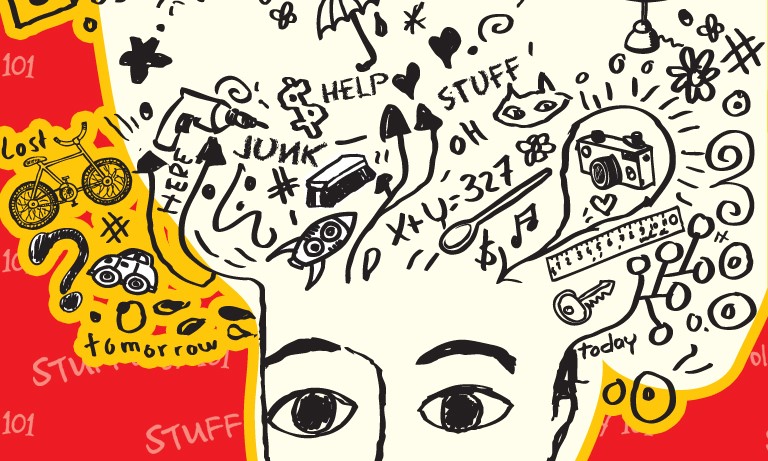Last week, I wrote about the importance of the new currency – attention. Bottom Line: It is more valuable than bitcoin or the USD.
Where we focus our attention redirects our time and energy. Time cannot be recovered.
Clutter—It’s Everywhere and We Don’t Even Notice!
Something that takes our limited time and energy is clutter. Some of us are so used to navigating around our possessions, we don’t even notice! Yet, it consumes our unrecoverable time. Consider homes with nearly every horizontal surface filled with “treasures.” Time spent dusting and wiping down these possessions grows into another mindless task. Not dusting causes health problems. The popular joke online about the person who sets out to accomplish a few tasks that day and grows distracted by other things that need to be done is true for many of us. At the end of the day, we’re exhausted and nothing on the list is done.

Physical clutter distracts us. Dishes in the sink. Untouched mail results in missed payments and late fees. The energy it takes to cope with our decisions postponed (clutter) looms so large we become exhausted.
We’re all busier now more than ever. Caregiving requires a lot of energy and time; especially, when a person with dementia is having a bad day and being uncooperative. Times like these require fewer things to focus on—less clutter.
Knowing that there will always be something to take our time; the best course of action is to do it now. It takes a lifetime of lessons before we’re motivated to do a task sooner than later.
I learned this in my fifties while living in a rural area. Power outages. Evacuations due to a massive fire. Needing to shovel five-feet of snow in front of my garage after windswept snow storms. No water due to a frozen line. I’ve learned to do whatever needs doing, now.
Letting the mail, laundry, or dishes accumulate creates feelings of overwhelm. Postponing work until the last minute? Why do we torture ourselves? Why do we let ourselves become paralyzed by making the task larger than it actually is?
And Then There’s Digital Clutter
Digital clutter creates an ongoing distraction. My ex-husband used to say it’s not clutter when it’s contained in a box (smartphone, laptop, desktop). Still, too many emails or text messages take valuable time away feeling at peace. Plus, we miss important correspondence because there’s too much. Facebook employees earning over $100,000 USD, create algorithms to hold our attention for longer than the 2-minute break we intended. Forty minutes later, we discover we need to be more aware of our distracted time.
Conscientious Caregiver Concerned about Clutter
As conscientious caregivers, among our other roles, we must find ways to help loved ones take steps to reduce the clutter in their lives. Postponing means we’ll tackle the task in crisis mode. There will come a time when our parents must downsize to move into a smaller and more manageable place or create space for someone to live-in.
While caring for my father with Alzheimer’s, I spent 100 hours across two weeks meticulously going through every sheet of paper. My father was notorious about placing a thing out of sight until he could deal with it later. I found a stack of $1,000 US Savings bonds tucked between two books in the living room bookcase. A $100 saving bond bookmarked a page in one of the volumes of a set of encyclopedias. After an estate sale, the buyer notified me. My father was overwhelmed; yet, insisted that he needed to review all of it.
Most of us learn to work around our clutter. It takes energy. And many will deny that it’s a constant distraction.
Declutter NOW.
Clutter reproduces. I don’t know how, but I have learned to limit its growth. I am mindful of what I bring into my home and office.
I’ve often thought that I will wait till I retire to reflect on my life and the books and paperwork over the years. This is highly unlikely. I’m too curious and continue reading and learning new things. My energy is less than the 12- to 16-hour days I’d work intensely not too long ago. Yet, reflecting on our lives is important to our mental, emotional, and spiritual health. Waiting is not the answer. I do it a bit at a time, each week.
My father never had the chance to review his possessions. Dementia came for a visit. In his mid-eighties, he was diagnosed with Alzheimer’s. After he settled here in California, I returned to his Wisconsin home to clear our his and my late mother’s accumulations across 45 years.
Now is the time.
When we surround ourselves with too much stuff, it drains our energy. We may not be aware of it, but our senses are working overtime amidst our clutter.
Each of us defines and manages clutter differently. Sometimes, we bring into adulthood our insecure coping mechanisms from childhood. Lack of stability from constantly moving creates the need to hold on. As adults, we have a choice. It’s not easy to break out of patterns that no longer serve us, but it’s important for our health.
Take time to declutter. Do it one step at a time. Invite your parents to tell you a story behind one of their possessions. Help them to let go. If it’s sentimental and you want it, ask for it. At first, the process is painfully hard. It gets easier over time.
Declutter in your own home, too.
Help your parents lighten their life’s burdens. They will feel more buoyant and more energetic. And you will have peace of mind.








